Mark 41 Bomb
Bounce the Rubble Higher
Explosive Power
10 Megatons or 25 Megatons
Hiroshima Equivalent Factor
Up to 1666x
Dimensions
12 ft. 4 inches x 52 inches
Weight
10,670 lbs.
Year(s)
1960–1963
Purpose
Our biggest bomb
About THE MARK 41 Bomb
Would you rather die than be a citizen of the Union of Soviet Socialist Republics? Would you rather that your whole family was killed rather than live under communist rule? Better dead than Red?
Why, of course.
The Mark 41 bomb is the Better dead than Red bomb, the big swingin’ dick bomb whose only purpose was just to be, whose only purpose was to show the Commies that we were both crazy and determined enough to build a bomb with no conceivable objective other than to annihilate cities, to burn them to the ground far faster and more efficiently than any Japan-fire-bombing could ever do. A bomb to break the will of the people, to break the will of the enemy, just by knowing that we have such a weapon.
It came in two flavors, a 10-megaton version and a 25-megaton version. The 10-megaton version, while offering a fireball only a mile and two-thirds across with the circle of third-degree burns spanning a mere twenty miles in total, had the benefit of less lethal radiation, as its third stage was wrapped in lead. You might imagine moving your troops right in after the blast in such a case. The 25-megaton version (2.4 mile fireball, thirty-mile radius third-degree burns) had quite a bit more bang and quite a bit more radiation, both due to the third stage being surrounded by uranium. With all those neutrons flying about to make the uranium-235 fission efficiently, adding that extra layer added a lot of punch to an already punchy weapon. Sorry about the fallout.
But what if 25-megatons just doesn’t do it for you? What if you need more? Then consider the Mark 41 your demonstration weapon, your proof-of-concept. That third stage was something new. The old-fashioned fission bomb goes off inside the Mark 41 and those ultra-high temperatures readies the new-fashioned thermonuclear part of the bomb. No need to stop with just these two stages. Those high temperatures are still there and can, in turn, allow another thermonuclear stage, a third stage. Or a fourth, or a fifth. There appears to be no limit to a daisy-chained thermonuclear bomb.
The Mark 41 was the first to have three stages.
It was introduced in 1960 and its retirement started three years later. Why such a small deployment for such a big bomb, the most explosive nuclear weapon that was ever produced by the United States? You might think that saner heads prevailed, that after the Red-fever broke we all realized that there was too much bomb and not enough target. That we mothballed it as part of a considered strategy of reducing the chance of a catastrophic nuclear war, that we, the Americans and the Soviets, agreed that the economic and political systems we were fighting over, even if it didn’t go our way, wasn’t worth cratering our human civilization with craters. That we at last recognized the Fermi trap we had fallen into, that the path we were on was leading inexorably toward species suicide, our equilibrium punctuated big time, and that we as humans of all nations needed to figure out a way out of the trap.
And, sure, that’s exactly what happened.
Gallery
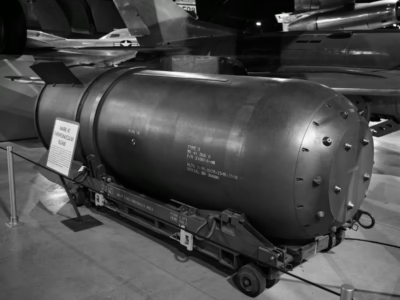
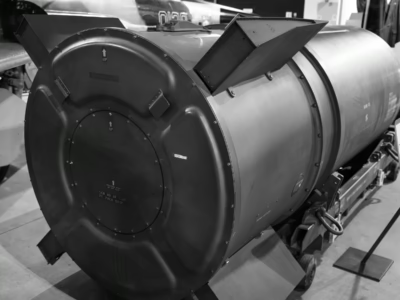
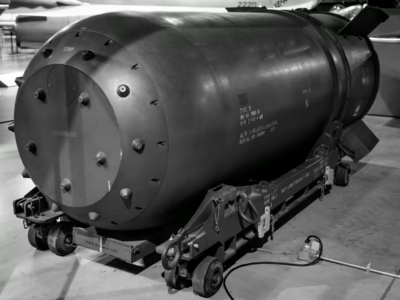
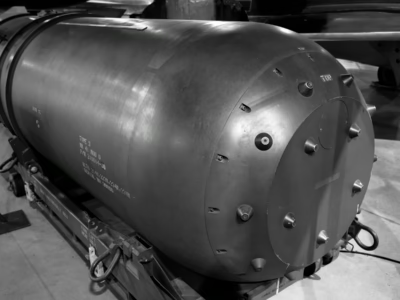
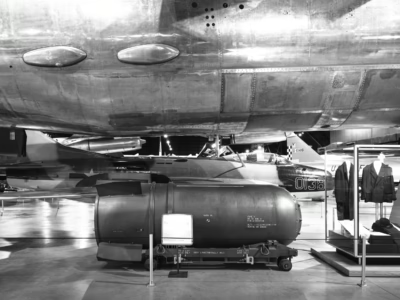
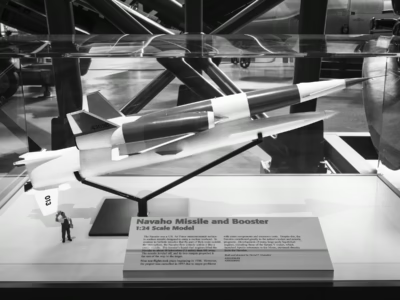
Nukemap
NUKEMAP is a web-based mapping program that attempts to give the user a sense of the destructive power of nuclear weapons. It was created by Alex Wellerstein, a historian specializing in nuclear weapons (see his book on nuclear secrecy and his blog on nuclear weapons). The screenshot below shows the NUKEMAP output for this particular weapon. Click on the map to customize settings.
Videos
Click on the Play button and then the Full screen brackets on the lower right to view each video. Click on the Exit full screen cross at lower right (the “X” on a mobile device) to return.
Further Reading
- Wikipedia, Nuclear Weapons Archive,
- The unclassified “History of the Mk 41 Weapon” from Sandia Labs, written in 1967.
- Alex Wellerstein, writing in the Bulletin of the Atomic Scientists, offers a history of bombs with massive explosive power, including the Mark 41, The Soviet Bomba Tsar, and more.
- More on Flashback (mentioned in Wellerstein’s article, above: “Flashback: America’s Tsar Bomb?“).
- A more technical but still largely readable outline of efforts to build a more advanced (not just more explosive power) nuclear weapon in the 1960s: Ripple: An Investigation of the World’s Most Advanced High-Yield Thermonuclear Weapon Design by Jon Grams.
- A short clip from Trinity and Beyond which shows a Mark 41 bomb being loaded into a B-52, then dropped, with its parachute deploying.